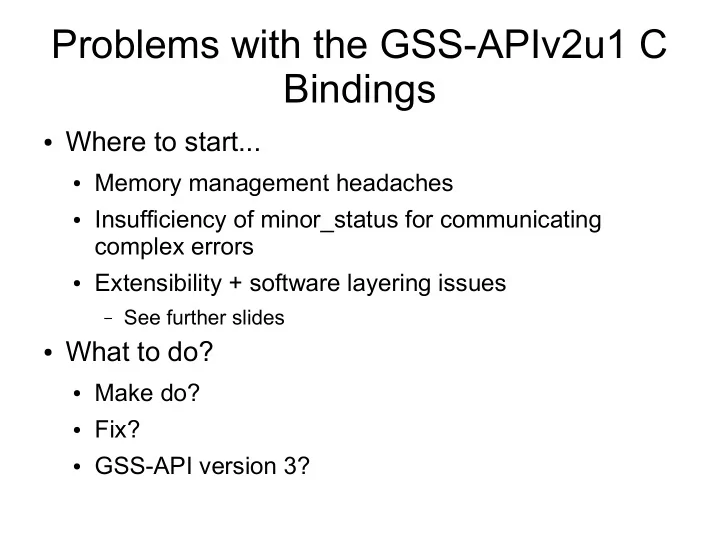

Problems with the GSS-APIv2u1 C Bindings ● Where to start... ● Memory management headaches ● Insufficiency of minor_status for communicating complex errors ● Extensibility + software layering issues – See further slides ● What to do? ● Make do? ● Fix? ● GSS-API version 3?
Memory Management Hell ● gss_buffer_desc is part of the ABI, often allocate on the stack (automatic) – Has no way to record how to release the actual buffer ● gss_release_buffer(), in a mechglue environment – what to do? ● This problem is urgent ● Likely solution: require all providers to use the same allocator as the mechglue – This requires good run-time linker fu, but we think we can make it work on all major OSes
Minor Status Issues ● Want to have detailed error messages about complex situations ● minor_status is an integer, not smaller than 32- bit, and, really, not larger than 64 ● What to do? ● So far MIT and Heimdal allocate minor_status values dynamically, mapping them to detailed info – Oops: when to release? When gss_display_status() is called?! LRU?
Extensibility/Layering Issues ● Layering: imagine sshd using GSS and PAM with a pam_ldap using libsasl using gss ● GSS used in two “apps” in same process ● Very common ● “don't do that” is not a very satisfactory answer ● Yes, some of this can be avoided by using IPC to add isolation ● Want GSS functions like... ● Set mechglue config ● Set mechanism config ● Set policy (cipher suites allowed, …)
Extensibility/Layering Issues ● Imagine a gss_acquire_cred() extension that can handle initial cred acquisition (interaction) ● New function to replace gss_acq._cred() vs. ● GSS_S_INTERACT → call gss_get_prompt() and gss_set_answer(), say – where to stash the prompt/answer? – If we had a call context, then we could stash them there
Solutions? ● There's at least four solutions that some of us have considered ● “PGSS-API” – Change minor_status arg in ABI backwards-compat way to a call context ● Change the header file ● Don't change the header file – Spec a GSS-API version 3 – Run-time linker fun (fun!) – More types, more functions (gss cred opts, sec ctx opts, …) ● we've been going down this path (think of gss_set_allowable_enctypes())
PGSS-API ● Variant 1: s/OM_uint32 *minor_status/gss_call_ctx_t call_ctx/ ● Variant 2: gss_alloc_call_ctx() → outputs a call context object and an OM_uint32 * to be passed to gss functions gss_release_call_ctx() → releases the call context and associated OM_uint32 ● Impact on mechglue/providers: must map input OM_uint32 * to call context (yes, it can be fast) Credit for initial PGSS use-case and solution: David Leonard @ Quest
GSS-APIv3 ● An opportunity to fix all sorts of issues ● New function/type/constant prefix? gss3? Gs3? ● But will any apps be changed to use it? ● v2u1→v3 shim should be feasible and desirable – Only apps need this: providers should get converted along with mechglue since we don't have an open SPI at the moment
Run-Time Linker Fun! (1) ● Apps would dlopen()/LoadLibrary() distinct copies the mechglue, and the mechglue would load distinct copies of the providers – Literal file copies – dlopen() knows about links! – Or new dlopen() flag to request a distinct load ● GSS functions with global state would affect only the global state of the loaded object, of which there may be many “local” copies, therefore global state → local state! – Magical! – We think we can make this work on major OSes – GSS function pointer set is equivalent to caller context handle
Run-Time Linker Fun! (2) ● How to make this manageable?! ● We could use a struct to hold gss fn *s ● We could use a function from a “gss loader” library or else a macro to load these ● Something like this, perhaps: gss_fn_set_v3u0_t gss = GSS_LOAD(); /* or */ gss_fn_set_v3u0_t gss = GSS_LOAD_OBJ(“/.../foo.so”); gss->set_config(...); gss->init_sec_context(...);
Run-Time Linker Fun! (3) ● GSS_LOAD*() macros might look like: do { \ void *hdl = dlopen(...); \ gss_load_fn_t fn; \ if (hdl != NULL && (fn = dlsym(hdl, …) != NULL) \ return fn(hdl, …); \ while (0); ● Or use GCC statement-expressions :)
Run-Time Linker Fun! (4) ● But! Whereas objects from a PGSS or GSSv3 provider/mechglue might be useable with distinct call contexts, objects from a distinct provider/glue cannot be safely passed to others! ● Huge gotcha? – Mostly not for layered software case, but it does mean that GSS objects can't be passed over non-GSS APIs (think of APIs for, say, RPCSEC_GSS).
Questions ● Sooner or later an implementor or three will badly want to do something about this ● We should specify a Standards-Track solution ● Which?! ● Nico dislikes the more-types-more-functions approach to addressing every sub-problem here ● Margaret dislikes PGSS variants ● Sam dislikes PGSS variant with header changes, thinks C++ will be impacted (not clear yet) ● Nico loves rtld games, but... this one?! Not sure.
Questions?
Recommend
More recommend